Micro-ATX Cases - Shoebox Showdown
by Joshua Buss on January 2, 2007 12:40 PM EST- Posted in
- Cases/Cooling/PSUs
Antec Aria - Interior
Opening the Aria is a bit like taking apart a puzzle, with multiple interconnected parts and some areas being totally inaccessible until uncovered. That's not to say it's difficult though - the top and side panels all remove individually with only one thumbscrew holding the top in place before the clips which hold the side panels in can be undone.
After all the covers have been taken off, the drive cage can be slid backwards then lifted up and out. With this view we can now see why the case feels so sturdy - the frame is extremely thick for a unit this size, and it is strongly reinforced at the corners. You can also see just how shallow the custom PSU is, which is the only reason a case this small is capable of holding a standard 5.25" optical drive.
Here's a more holistic view of all the parts of the Aria, with the frame of the case being viewed from its left side and the drive cage from underneath with the front of it resting on the table. Getting the micro-ATX motherboard into the somewhat cramped frame isn't the easiest thing in the world, but if the PSU can be removed for a little extra clearance if necessary.
Considering there isn't any other permanently mounted active cooling elements to the case other than the PSUs, we really have to start seeing how parts fit into the Aria to look more closely at the design of the case. Here is the test bed's motherboard with a Zalman CNPS 7000 CU cooler installed to give an idea how tight a fit some parts can be.
Attaching cables and installing our 6600 GT required a little finagling, but was easy overall. Larger video cards could be a real problem for any case this small, and using all four expansion slots would likely push things too far, in terms of cooling.
Opening the Aria is a bit like taking apart a puzzle, with multiple interconnected parts and some areas being totally inaccessible until uncovered. That's not to say it's difficult though - the top and side panels all remove individually with only one thumbscrew holding the top in place before the clips which hold the side panels in can be undone.
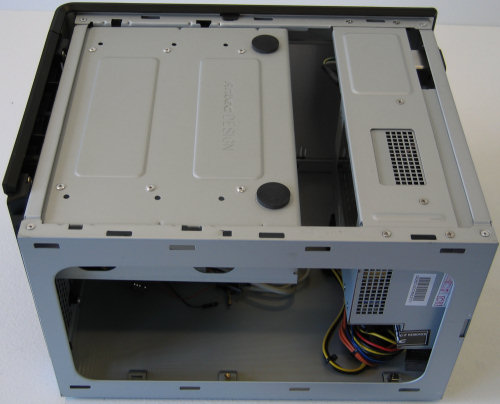 |
| Click to enlarge |
After all the covers have been taken off, the drive cage can be slid backwards then lifted up and out. With this view we can now see why the case feels so sturdy - the frame is extremely thick for a unit this size, and it is strongly reinforced at the corners. You can also see just how shallow the custom PSU is, which is the only reason a case this small is capable of holding a standard 5.25" optical drive.
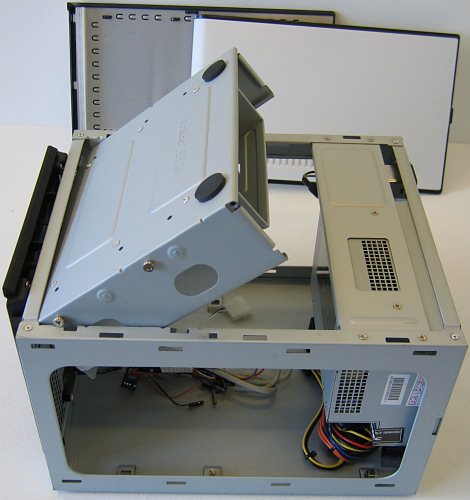 |
| Click to enlarge |
Here's a more holistic view of all the parts of the Aria, with the frame of the case being viewed from its left side and the drive cage from underneath with the front of it resting on the table. Getting the micro-ATX motherboard into the somewhat cramped frame isn't the easiest thing in the world, but if the PSU can be removed for a little extra clearance if necessary.
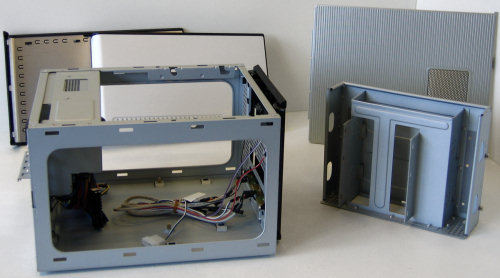 |
| Click to enlarge |
Considering there isn't any other permanently mounted active cooling elements to the case other than the PSUs, we really have to start seeing how parts fit into the Aria to look more closely at the design of the case. Here is the test bed's motherboard with a Zalman CNPS 7000 CU cooler installed to give an idea how tight a fit some parts can be.
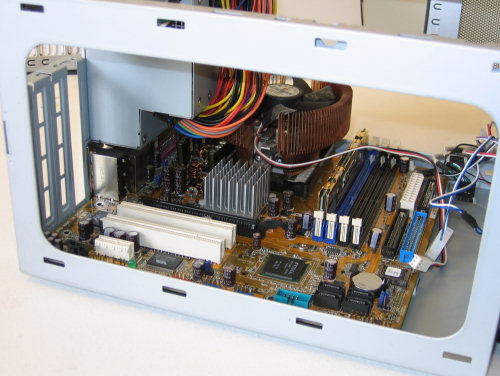 |
| Click to enlarge |
Attaching cables and installing our 6600 GT required a little finagling, but was easy overall. Larger video cards could be a real problem for any case this small, and using all four expansion slots would likely push things too far, in terms of cooling.
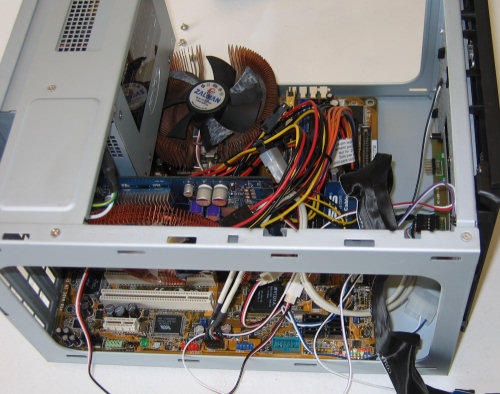 |
| Click to enlarge |










37 Comments
View All Comments
shenoyh - Tuesday, January 2, 2007 - link
Just curious..there seems to be enough space and screw-holes for a regular ATX motherboard ...though it would be a tight fit.JarredWalton - Tuesday, January 2, 2007 - link
If it can fit a regular ATX board, it would no longer be a micro-ATX case - at least, that's how I see it.OrSin - Tuesday, January 2, 2007 - link
How can you do a M-ATX review and not have the Sugo in it. Its price is nice and workmanship on par with the Qmicra. With the huge difference in pricing I would think even full systems can be reveiwed.JarredWalton - Tuesday, January 2, 2007 - link
Generally, we review what we get. If Sugo wants to send Josh a case for review, I'm sure he would be happy to include it. Obviously, a look at three cases is not going to be a comprehensive roundup, but it's virtually impossible to include every potential candidate in an article.KingDaPuma - Tuesday, January 2, 2007 - link
Great review. Thanks. I note that the cases were tested with the GeForce 6600GT. Will any of the new DX10 cards (GeForce 8800, ATI R600, etc.) fit within any of these SFF cases?blinkin2000 - Wednesday, January 3, 2007 - link
The 8800GTX Fits but you must cut a hole for power connectors and you loose the lower 5.25" bay, but it fits.blinkin2000 - Wednesday, January 3, 2007 - link
in the microflywilburpan - Tuesday, January 2, 2007 - link
If I read your review correctly, it looks like the main source of noise was from the power supply fan. Would it be possible to replace the fan to try to cut down on the noise? Failing that, are these power supplies proprietary enough so that they can't be swapped out?mpc7488 - Tuesday, January 2, 2007 - link
From the Microfly Final Words: "If you want to use a different full-size ATX PSU, you can get the case only for as little as $50."IMO, accepting a full-size ATX replacement is a huge plus for this case. Everyone I know with a Shuttle cube has had a power supply fail in 1-2 years, they're not that cheap to replace, and output capacities are very limited.
Schmide - Friday, January 5, 2007 - link
Agreed, However I got this case and the funny thing is the X-connect doesn't fit in this case. Aren't these the same brand. Lollerskates...